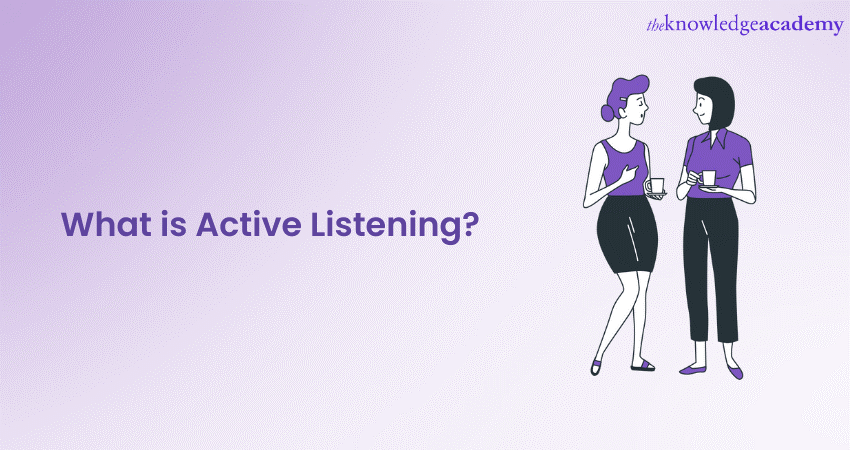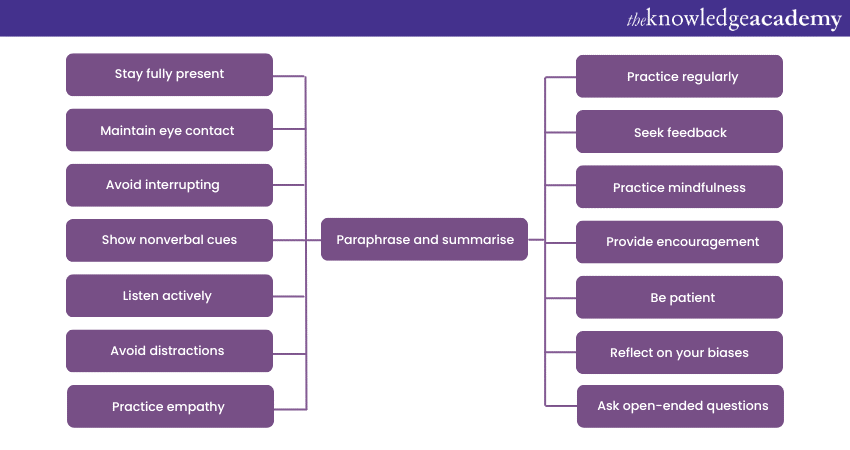We may not have the course you’re looking for. If you enquire or give us a call on +45 89870423 and speak to our training experts, we may still be able to help with your training requirements.
Training Outcomes Within Your Budget!
We ensure quality, budget-alignment, and timely delivery by our expert instructors.

Active Listening is an extremely powerful communication skill that goes beyond hearing words. It involves being fully engaged, empathetic, and attentive to the speaker's message. Understanding What is Active Listening is vital to develop meaningful connections, effective problem-solving, and a more compassionate society.
From personal relationships to professional environments, honing Active Listening skills plays a pivotal role in enhancing communication and building relationships. In this blog, you will learn What is Active Listening and its principles, its benefits, as well as techniques and tips to develop and improve them.
Table of Contents
1) What is Active Listening and its principles?
2) The benefits of Active Listening
3) Techniques to develop Active Listening skills
4) The importance of Active Listening in multiple settings
5) Tips to Improve Active Listening
6) Conclusion
What is Active Listening and its principles?
Active Listening is an essential skill for communication that involves fully concentrating, understanding, responding, and remembering what the speaker is saying. It goes beyond merely hearing the words spoken. It entails actively engaging with the speaker to comprehend their message and demonstrate genuine interest.
Principles of Active Listening
We can define Active Listening as a necessary skill for communication that goes beyond hearing words. It involves being fully engaged and empathetic to the speaker's message. Understanding the Principles of Active Listening is vital for developing meaningful connections and effective communication. Let’s take a look at some of them below:

1) Give undivided attention: Focus completely on the person who is speaking. Avoid distractions and show genuine interest in what they have to say.
2) Show empathy and understanding: Acknowledge the speaker's emotions and perspectives, demonstrating compassion and validation.
3) Avoid interrupting: Allow the speaker to express themselves fully without interruptions, enabling them to convey their thoughts coherently.
4) Use verbal and nonverbal cues: Employ affirmative gestures, nodding, and appropriate responses to indicate your attentiveness and engagement.
5) Paraphrase and clarify: Periodically restate the speaker's main points to ensure accurate understanding and show that you are Actively Listening.

The Benefits of Active Listening
Active Listening offers a wide range of benefits that positively impact both individuals and relationships. There are many Benefits of Active Listening. Let’s take a look at some of them below:
1) Enhanced understanding: Actively Listening allows us to grasp the speaker's message more comprehensively, leading to clearer communication and reduced misunderstandings.
2) Stronger relationships: By being attentive and empathetic listeners, we nurture trust and emotional connections, strengthening our relationships with others.
3) Conflict resolution: Active Listening plays a crucial role in resolving conflicts, as it helps identify common ground and find mutually beneficial solutions.
4) Empathy development: Actively Listening fosters empathy, enabling us to understand and respond with compassion to the feelings and perspectives of others.
5) Improved decision-making: By considering various viewpoints through Active Listening, we can make more well-informed and balanced decisions.
6) Boosted productivity: In the workplace, Active Listening primarily boosts collaboration and teamwork. This will lead to creating a positive work environment that promotes creativity and productivity.
7) Personal growth: Actively Listening to feedback and constructive criticism supports personal growth and self-improvement.
Active Listening is a valuable skill with multifaceted benefits. It not only improves communication and relationships but also promotes empathy, understanding, and personal growth. By incorporating Active Listening into our daily interactions, we create a more harmonious and compassionate world.
Techniques to develop Active Listening skills
Developing Active Listening skills is essential for becoming a more effective and empathetic communicator. Here are some valuable tips to enhance your Active Listening abilities:

1) Stay fully present: Be fully present in the conversation, giving your undivided attention to the speaker. Avoid distractions and focus on the here and now.
2) Maintain eye contact: Maintain consistent eye contact with the speaker to convey your attentiveness and engagement.
3) Avoid interrupting: Refrain from interrupting the speaker while they are talking. Let them finish expressing their thoughts before responding.
4) Show nonverbal cues: Use nonverbal cues such as nodding, smiling, and using affirmative gestures to encourage the speaker.
5) Listen actively: Listen actively by being receptive to the speaker's words, tone, and emotions. Be genuinely interested in what they have to say.
6) Avoid distractions: Minimise external distractions by putting away electronic devices to stay focused on the conversation.
7) Practice empathy: Try to understand the speaker's feelings and perspectives, putting yourself in their shoes to see things from their point of view.
8) Paraphrase and summarise: Periodically paraphrase or summarise what the speaker has said to confirm your understanding and show that you are following the conversation.
9) Ask open-ended questions: Pose open-ended questions that motivate the speaker to elaborate on their thoughts and share more information.
10) Reflect on your biases: Be aware of your own biases and prejudices and strive to listen without judgment or preconceived notions.
11) Be patient: Some individuals may take time to express themselves fully or find the right words. Be patient and give them the time they need to communicate effectively.
12) Provide encouragement: Offer words of encouragement and support to show that you value the speaker's thoughts and ideas.
13) Practice mindfulness: Engage in mindfulness techniques to improve your focus and reduce internal distractions while listening.
14) Seek feedback: Ask for feedback on your Active Listening skills from trusted friends, family members, or colleagues.
15) Practice regularly: Like any skill, Active Listening improves with practice. Engage in meaningful conversations and actively apply these tips regularly.
By incorporating these tips into your interactions, you can develop strong Active Listening Skills, which will lead to more meaningful connections, better understanding, and improved communication in both personal and professional settings.
The importance of Active Listening in multiple settings
Active Listening holds immense importance in multiple settings, it plays a significant role in fostering effective communication and building strong connections. Let's explore the Importance of Active Listening in various settings below:
1) Personal relationships: In personal relationships, Active Listening is crucial for understanding each other's emotions, needs, and concerns. It creates a supportive and empathetic environment, leading to healthier and more harmonious relationships.
2) Professional environments: Active Listening is a key aspect of successful communication in the workplace. It promotes better collaboration among team members, enhances problem-solving abilities, and boosts overall productivity.
3) Education and learning: n educational settings, Active Listening is a must-have skill for students to absorb and retain information effectively. It allows them to comprehend complex concepts and actively participate in discussions, leading to improved academic performance.
4) Conflict resolution: In situations of conflict or disagreement, Active Listening can facilitate resolution by allowing all parties to express their perspectives. Understanding each other's viewpoints fosters empathy and opens the door to finding common ground.
5) Mental health and counselling: Active Listening is a fundamental skill in counselling and therapy sessions. Therapists use this technique to develop a safer space for clients to express their emotions and thoughts, aiding in their healing and growth.
6) Parent-child communication: In parent-child relationships, Active Listening strengthens the bond between parents and their children. It helps parents better understand their child's feelings and needs, promoting a nurturing and supportive environment.
7) Social settings: Active Listening enhances social interactions by making individuals feel valued and respected. It enables deeper connections with others and promotes meaningful conversations.
8) Teaching and training: Effective teaching involves Active Listening to students' questions and feedback. Educators who actively listen can customise their teaching methods to fulfil the needs of their students.
9) Public speaking and leadership: Active Listening is an essential skill for leaders and public speakers. By understanding the audience's responses and feedback, speakers can adjust their message to effectively convey their ideas.
10) Negotiations and diplomacy: In negotiations and diplomacy, Active Listening promotes mutual understanding and trust between parties. It paves the way for successful agreements and collaborations.
11) Healthcare and patient care: Active Listening is critical in healthcare settings, enabling healthcare providers to understand patients' symptoms and concerns accurately. It improves patient outcomes and enhances the overall patient experience.
12) Community engagement: Active Listening is a powerful tool for community leaders and organisers. By attentively listening to community members' needs and aspirations, leaders can effectively address issues and initiate positive change.
13) Sales and marketing: In sales and marketing, Active Listening helps professionals understand customers' preferences and pain points, allowing them to tailor their offerings to meet specific needs.
14) Social justice and advocacy: Active Listening is essential in social justice and advocacy work. It allows advocates to grasp the experiences of marginalised groups, leading to more effective and empathetic advocacy efforts.
15) Interviews: Whether for job positions or research purposes, Active Listening in Interviews is extremely crucial. Interviewers who actively listen can gather comprehensive information about candidates or subjects, making informed decisions and conducting more insightful interviews.
16) Customer service: Active Listening is vital in customer service interactions. By attentively listening to customers' inquiries and concerns, service providers can offer tailored solutions, leading to higher customer satisfaction.
Active Listening is a valuable skill applicable in various settings. Its significance lies in its ability to build bridges of understanding, strengthen relationships, and create positive and empathetic environments, contributing to personal growth and societal harmony.
Deliver unforgettable experiences and elevate customer service skills to new heights with our Exceptional Customer Service Training. Sign up now!
Tips to Improve Active Listening
Listening is a powerful skill that requires continuous refinement for effective communication. In order to enhance Active Listening abilities, consider incorporating the following techniques:
1) Give nonverbal cues: Nodding, smiling, and using appropriate facial expressions encourage the speaker to feel valued and understood.
2) Listen for feelings and emotions: Pay close attention to the speaker's tone and emotions, providing deeper insights into their message.
3) Focus on content, not delivery: Concentrate on understanding the message's substance rather than being distracted by the speaker's manner of speaking.
4) Be fully present: Clear your mind of distractions and focus entirely on the ongoing conversation.
5) Provide feedback: Offer appropriate feedback and encouragement to let the speaker know they are being actively heard.
6) Reflect on your biases: Be mindful of personal biases that may influence your perception of the speaker's message.
Implementing these tips and techniques can help significantly improve your Active Listening skills. Moreover, you will become a more attentive and empathetic communicator. Enhanced Active Listening fosters better understanding, strengthens relationships, and promotes effective communication in various aspects of life.
Master Active Listening skills for deeper connections with our Active Listening Skills Training. Sign up today!
Conclusion
We hope you read and understand What is Active Listening and how it can help you. Honing Active Listening skills is vital for encouraging genuine connections, understanding others' perspectives, and improving communication. By staying present, showing empathy, and avoiding interruptions, we can create a more empathetic and harmonious world.
Unleash Your full potential with Personal Development Training with our Personal Development Training Courses. Sign up now!
Frequently Asked Questions
Upcoming Business Skills Resources Batches & Dates
Date
 Active Listening Training
Active Listening Training
Fri 31st Jan 2025
Fri 21st Mar 2025
Fri 30th May 2025
Fri 18th Jul 2025
Fri 19th Sep 2025
Fri 21st Nov 2025







 Top Rated Course
Top Rated Course


 If you wish to make any changes to your course, please
If you wish to make any changes to your course, please


